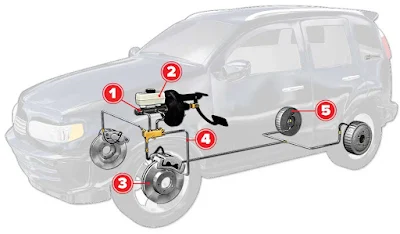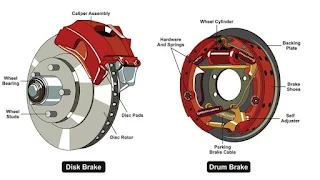The Importance of Brakes in Your Car
Brake
 |
| Basic Component's 1) Master Cylinder, 2) Brake Fluid Bottle 3) Front Disk's 4) Brake Tube 5) Rear Drum's |
Brakes are an essential part of car. Without them, a vehicle would not be able to slow down or stop, which could lead to dangerous and potentially fatal accidents. A brake is a mechanical device that absorbs energy from a moving system, allowing a car to slow down the speed or stop when you needed. Brakes also help keep the car in control, especially when making sharp turns or coming to a sudden stop. For these reasons, it is important to make sure your car's brakes are in good working condition.
How brakes work
.jpeg) |
| Disk Brake Components |
Brakes are an integral part of your car's safety system and they work by slowing down or stopping the motion of a moving vehicle. They use friction to achieve this and consist of two main components: brake pads and brake fluid.
Brake pads are made of a strong material such as metal or ceramic that when compressed against the rotor, create friction which results in a slowing or stopping motion. The rotor attached with wheel, so when the brake pads press against it, the wheels stops spinning.
Brake fluid is a liquid which transfers the energy created by the brakes to the brake pads. It is also responsible for reducing heat generated from friction. Brake fluid flows from the master cylinder of calipers they are connected to the brake pads, it's providing pressure for the brakes to work. Without brake fluid, the brakes would not be able to work properly.
In conclusion, brakes are essential for keeping your car safe and functioning properly. They use friction to slow or stop the wheels from spinning, with brake pads and brake fluid playing key roles in this process. It is important to take proper care of your brakes and replace them when necessary in order to maintain safe driving conditions.
Why brakes are important
Brakes are a critical safety component of your car. They play an important role in slowing or stopping your vehicle, and they are essential to your car's overall performance and road safety. Without brakes, you wouldn't be able to control the speed and direction of your vehicle.
Brake pads and brake fluid are two major components of a braking system. Brake pads are used to reduce the force applied to the rotor when the brakes are engaged, and the brake fluid acts as a hydraulic medium for transferring pressure from the brake pedal to the brakes. These two components are essential for a well-functioning braking system.
Having working brakes is essential for ensuring your safety on the road. Without them, it would be impossible to slow down or come to a stop quickly in an emergency situation, which could lead to a potentially hazardous accident. Additionally, brake pads help reduce wear on the rotor and other parts of the braking system, which can increase their lifespan.
Finally, brakes can provide a smoother and safer ride. Properly functioning brakes will ensure that your car stops smoothly and quickly when needed, and will allow you to take corners and turns without skidding or losing control of the vehicle.
In conclusion, brakes are an important safety feature for any car. Taking care of your brakes is essential for ensuring a safe and reliable ride. Make sure to regularly check your brake fluid levels and condition of the brake pads, and replace them when necessary. By keeping up with your car's maintenance, you can ensure that your brakes are always performing at their best.
When to replace your brakes
.jpeg) |
| Disk and Brake Pads |
 |
| Ventilated Disk |
Knowing when to replace your brakes is important in order to keep your car running smoothly and safely. Brake pads should be replaced once the thickness of the pad material has worn down to about 2-3mm. If the brake pad is wearing thin, it will cause a squeaking sound when you press the brake pedal. It is also important to check the brake fluid level regularly. If the fluid level is lower than usual, this may indicate that your brakes need to be replaced soon.
It is recommended that you have your brakes inspected at least once every 12 months or after 12,000 miles. During a professional brake inspection, a technician will check the condition of the brake pads, rotor, caliper, brake lines and other related components. If any of these parts are worn out or need to be replaced, they will recommend the necessary repairs or replacements.
By keeping up with routine maintenance and checking on your brakes regularly, you can ensure your safety on the road. Replacing your brakes when needed can save you money by preventing costly damages from occurring in the future. When in doubt, it's always best to consult a professional for advice on when to replace your brakes.
How to take care of your brakes
It’s important to take care of your brakes so that they last as long as possible. To do this, you should have them inspected regularly and replace any worn parts, such as the brake pads or brake fluid.
Brake pads are essential for proper braking. They should be replaced every 50,000 miles or as recommended by your mechanic. If the brake pads become too thin, the rotors may overheat and cause damage to your brake system. To avoid this, make sure you regularly inspect your brake pads and replace them when necessary.
Brake fluid is also important for maintaining proper brake function. Over time, brake fluid can become contaminated or lose its viscosity due to age and wear, resulting in poor braking performance. Therefore, it's important to check your brake fluid regularly and top it up if needed. You should also consider replacing the brake fluid completely every two years or 24,000 miles to ensure your brakes remain in good condition.
By taking the time to properly care for your brakes, you can ensure they will last longer and help keep you safe while driving.
Types Of Brake System
 |
| Disk and Drum Brake |
 |
| Disk and Drum Brake |
There are many different types of brake systems available for automobiles. The most common types are disc brakes, drum brakes, and brake fluid systems. Each system has its own advantages and disadvantages, so it’s important to understand the differences before deciding which type of brake system is best for your vehicle.
Disc Brakes: Disc brakes are composed of a pair of brake discs mounted on the wheels. The brake discs have an inner rotor and an outer rotor connected to a caliper containing two brake pads. When the brakes are applied, the pads press against the rotors and friction is created, causing the vehicle to slow down or stop. Disc brakes are a more efficient option than drum brakes and are usually used on cars with higher speed capabilities.
Drum Brakes: Drum brakes use two wheel cylinders and two brake shoes that press outward against the inside of a rotating drum. As the wheel turns, the brake shoes rub against the inside of the drum, creating friction and slowing the vehicle down. Drum brakes are usually found on older vehicles but can be found on some newer models as well.
Brake Fluid Systems: Brake fluid systems use a combination of brake fluid and pressure to slow the vehicle down. When the brakes are applied, the pressure causes a piston in the brake fluid system to push on the brake pads, creating friction and slowing the vehicle down. This type of brake system is commonly found on newer vehicles.
No matter which type of brake system you choose for your car, it’s important to make sure that your brakes are properly maintained by checking the brake fluid levels and replacing worn out brake pads when necessary. Doing so will help ensure that your vehicle has adequate stopping power when needed.


.jpeg)
